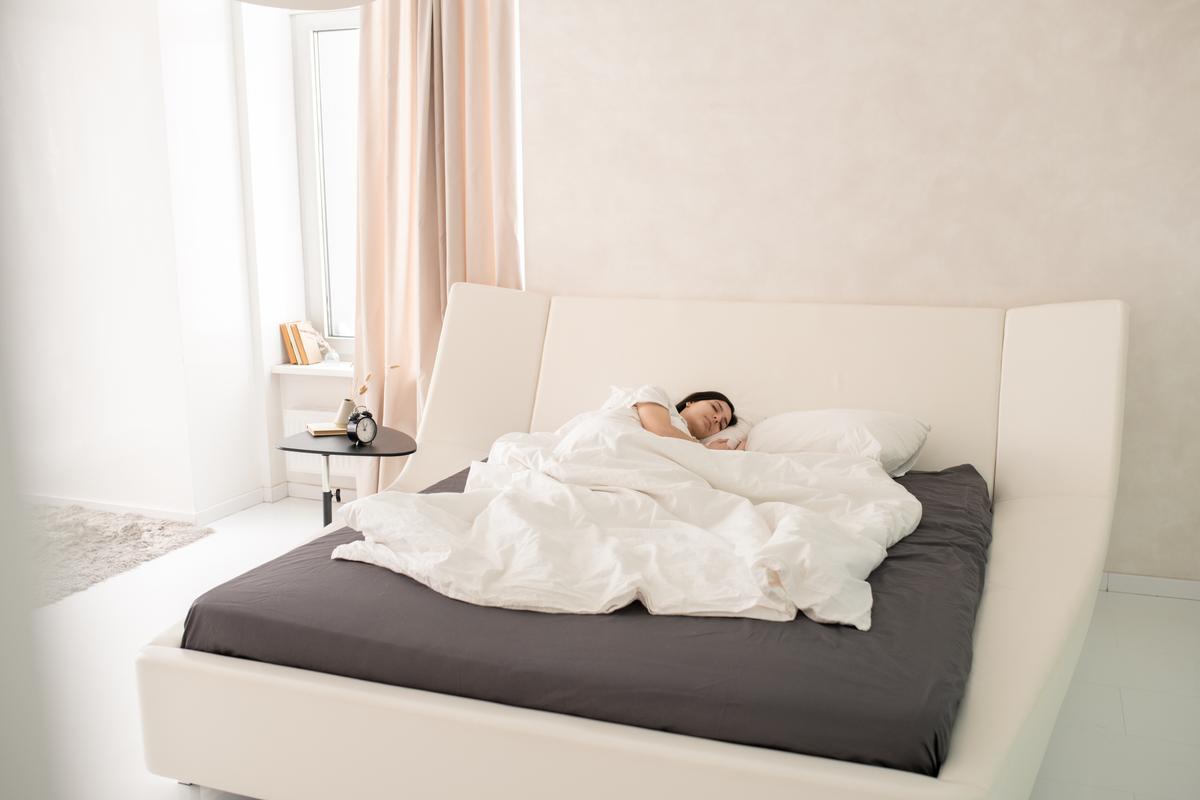The Role of Bed Linen in Achieving a Restful Night's Sleep
Are you tired of tossing and turning all night, desperately searching for that elusive restful sleep? Look no further than your bed linen. Yes, you read that right! The secret to achieving a truly rejuvenating night's sleep lies in the quality of your sheets, duvet covers, and pillowcases. Bed linen plays a crucial role in creating an inviting and comfortable sleep environment one that promotes relaxation and tranquility. In this blog post, we will explore how choosing the right bed linen can transform your bedroom into a sanctuary of sweet dreams. So let's dive in and discover the secrets to selecting sleep-enhancing bed linens for those well deserved restful nights.
The Importance of Bed Linen
When it comes to achieving a restful night's sleep, the importance of bed linen cannot be overstated. Your choice of sheets, duvet covers, and pillowcases can have a significant impact on your overall sleep quality and comfort.
High-quality bed linen is essential for promoting optimal temperature regulation. Breathable fabrics like cotton or linen allow air to circulate around your body, preventing overheating and excessive sweating during the night. This helps you stay cool and comfortable throughout your slumber.
Additionally, the texture of your bed linen plays a crucial role in creating a soothing environment that promotes relaxation. Soft and smooth materials not only feel luxurious against your skin but also contribute to reducing any potential irritations or discomforts that may disrupt your sleep.
Furthermore, investing in good quality bed linen can provide long-term benefits for both durability and hygiene. High-thread-count sheets are less likely to pill or wear out quickly, ensuring they will stand the test of time. Additionally, easy-to-care-for materials make laundering a breeze while maintaining their softness and freshness over countless washes.
Choosing the right bed linen is key to creating an inviting sleep haven where you can unwind after a long day. The combination of breathable fabrics with comforting textures will enhance your comfort levels while providing longevity and ease of care for years to come.
Types of Sheet Materials
When it comes to choosing the right bed linen for a restful night's sleep, one of the most important factors to consider is the type of sheet material you opt for. The material can greatly impact your comfort and overall sleep experience.
Cotton sheets are perhaps the most popular choice due to their breathability and softness. They are available in various thread counts, which determine their quality and durability. Higher thread counts generally indicate a smoother feel, but keep in mind that personal preference plays a role here too.
If you're looking for something more luxurious, silk sheets may be worth considering. Not only do they have a smooth and silky texture against your skin, but they also help regulate body temperature by keeping you cool in summer and warm in winter.
For those with sensitive skin or allergies, bamboo sheets could be an excellent option. Bamboo has natural hypoallergenic properties and is incredibly soft. It is also moisture wicking, making it ideal for hot sleepers who tend to sweat during the night.
Linen sheets offer a unique look and feel with their textured appearance. They are highly breathable, allowing air circulation while providing warmth when needed. Linen tends to soften over time as well, ensuring maximum comfort as you continue using them.
Selecting the right sheet material is crucial for achieving a restful night's sleep. Consider factors such as breathability, softness, hypoallergenic properties, and personal preferences when making your decision. Remember that investing in high-quality bed linen can make all the difference in enhancing your sleep experience.
How to Choose the Right Bed Linen
One crucial factor in achieving a restful night's sleep is choosing the right bed linen. With so many options available, it can be overwhelming to know where to start. However, by considering a few key factors, you can find the perfect bedding that meets your individual needs.
Consider the material of the sheets. Cotton is a popular choice due to its breathability and softness. Egyptian cotton is known for its luxurious feel, while organic cotton is ideal for those with sensitive skin or allergies. If you prefer warmth, flannel sheets are perfect for colder climates.
Thread count is another important consideration when selecting bed linen. A higher thread count typically indicates better quality and durability. However, it's essential to note that other factors such as fabric type also impact the overall comfort of the sheets.
Think about your personal preferences regarding texture and feel. Some people enjoy crisp percale sheets, while others prefer the smoothness of sateen or silk.
Don't forget about aesthetics! Choose colors and patterns that create a calming atmosphere in your bedroom and reflect your personal style.
By taking these factors into account when choosing your bed linen, you'll be well on your way to creating an inviting sleep environment conducive to peaceful nights of slumber.
How to Care for Your Bed Linen
When it comes to achieving a restful night's sleep, the quality of your bed linen plays a crucial role. But it's not just about choosing the right materials and designs; you also need to know how to properly care for your bedding to ensure its longevity and maintain its comfort.
Always check the label instructions before washing your bed linen. Different materials may require different care methods. Generally, cotton sheets can be machine washed with warm water and mild detergent. Avoid using bleach as it can damage the fabric.
To prevent any shrinkage or color fading, separate your bed linen from other items during washing. Opt for a gentle cycle setting and use a low heat setting when drying them in the dryer.
If you prefer air-drying your bed linen, hang them outside or on an indoor drying rack away from direct sunlight. This will help preserve their colors and prevent excessive wrinkling.
Ironing is optional but can give that crisp look to your bed linen if desired. Be sure to follow the ironing instructions provided by the manufacturer for best results.
Store your freshly cleaned bed linen in a cool, dry place such as a closet or drawer until ready for use again. This will protect them from dust and keep them fresh-smelling between uses.
By following these simple care tips, you can extend the lifespan of your bed linen while ensuring optimal comfort every night.
Tips for a Restful Night's Sleep
Achieving a restful night's sleep is essential for our overall well-being and quality of life. While there are many factors that contribute to a good night's sleep, one often overlooked aspect is the role of bed linen. The right choice of bed linen can make a significant difference in the quality of your sleep. In this article, we have explored the importance of bed linen, discussed different types of sheet materials, provided tips on choosing the right bed linen, and offered advice on how to care for it.Now that you understand why bed linen plays such an important role in promoting restful nights, let's explore some additional tips to enhance your sleeping experience.
Opt for natural fabrics: Look for sheets made from breathable and hypoallergenic materials like cotton or bamboo. These fabrics help regulate body temperature and wick away moisture, keeping you cool and comfortable throughout the night.
Consider thread count: Thread count refers to the number of threads per square inch in a fabric. While high thread counts are often associated with better-quality sheets, keep in mind that anything between 200-800 is considered suitable for most people.
Prioritize comfort:Choose bedding that feels soft against your skin and provides adequate support. Experiment with different textures and finishes until you find what works best for you.
Invest in proper mattress protection:A mattress protector not only prolongs the life of your mattress but also adds an extra layer of comfort and hygiene to your sleep surface.
Create a calm sleeping environment: Keep your bedroom clean, clutter-free, cool, and dark to promote relaxation before bedtime.
Develop a bedtime routine: Establishing consistent pre-sleep rituals signals your body that it's time to unwind and prepare for slumber.
Get into rhythm with regular exercise : Engaging in moderate physical activity during the day can help promote deeper sleep at night.
Reduce screen time before bed: The blue light emitted by electronic devices can interfere with your body's natural sleep.
The Role of Bed Linen in Achieving a Restful Night's Sleep cannot be understated. Your bed linen choice impacts your comfort, temperature regulation, and overall sleep quality. Whether you opt for the classic comfort of cotton or the luxurious feel of silk, consider your personal preferences, climate, and maintenance routine to ensure a restful night's sleep.
FAQs / Frequently Asked Questions
Is silk bed linen worth the investment?
Silk bed linen is worth it if you value a luxurious, comfortable sleep experience and have the budget for it.
Can the color of bed linen affect my sleep quality?
Yes, the color of your bed linen can influence your mood and sleep quality. Cool colors promote relaxation, while warm colors may be stimulating.
How often should I wash my bed linen?
It's advisable to wash your bed linen regularly, ideally once a week, to maintain cleanliness and freshness.
Are there specific care instructions for silk bed linen?
Yes, silk bed linen should be hand-washed or machine-washed on a gentle cycle with mild detergent. Air-drying is recommended to maintain its quality.
What is the ideal thread count for bed linen?
The ideal thread count depends on personal preference. Some prefer higher thread counts for a softer feel, while others prefer lower counts for breathability.
Can cotton bed linen be hypoallergenic?
High-quality cotton bed linen can be hypoallergenic, especially if it's woven tightly and properly maintained.


